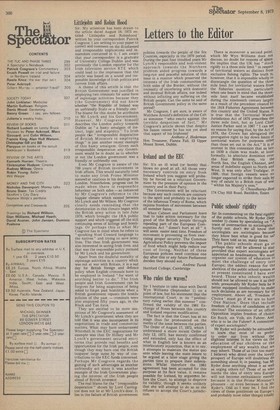Littlejohn and Robin Hood Sir: My attention has been drawn
to the article dated August 18, 1973 entitled " Littlejohn and Rob inhood' written by your correspondent Patrick Cosgrave. I am writing to your paper to correct and comment on the ill-informed and irresponsible implications and innuendoes contained in it. I am aware that your correspondent is a graduate of University College Dublin and was previously the London reporter for the Irish television service RTE which could lead to the impression that the article was based on a sound and responsible knowledge of Irish politics and current Irish affairs.
A theme of this article is that the British Government was justified in employing two criminals for some form of espionage activities because they (the Government) did not know whether "the Republic of Ireland was an unfriendly State or a friendly one." The blame for this doubt he attributes to Mr Lynch and his Government. However, Mr Cosgrave himself describes the London policy towards Dublin as "a hasty amalgam of instinct, logic and stupidity." To Irish people tke "irresponsible desperation of British Ministers in employing thugs" is just another recent example of this hasty amalgam. Given such irresponsible desperation any Government would be in doubt as to whether or not the London government was a friendly or unfriendly one. Even Mr Cosgrave is aware of the 700 years of British involvement' in Irish affairs. This would naturally tend to make any Irish Prime Minister somewhat cautious in his dealings with London. Nonetheless, progress can be made when there is responsible behaviour on both sides —as instanced by Mr Cosgrave's reference to the happier climate which existed between Mr Lynch and Mr Wilson. Mr Cosgrove clearly needs reminding that the deterioration in this climate began with the British army action in late June 1970, which brought the IRA public support and which triggered off the still continuing series of killings and bombings. Or perhaps this is what Mr Cosgrave has in mind when he refers to "speaking Noel Coward language to the natives" and trying to save army lives. The then Irish government was also interested in saving Irish lives, and that was the responsible policy pursued by Mr Lynch and his government. Apart from the doubtful morality of espionage activities in a country which was not at war with Britain, it is a sad day for British foreign and defence policy when English criminals have to be employed in Ireland " for want of anything better to do." The Irish people and Irish Government can be forgiven for being suspicious of being asked to forget past hostilities when a British government repeats the hostile policies of the past — criminals were also employed fifty years ago, in the Black and Tan force.
They are entitled to be more suspicious of Mr Cosgrave's assessment of Mr Lynch's government when they are told that it was also incompetent in its negotiations in trade and commercial matters. What may have embarrassed Whitehall in the EEC negotiations for example was that Dr Hillery and Mr Lynch's government secured entry terms that provide real benefits and opportunities for the Irish people, even though they may have cost the British taxpayer large sums by way of contributions to the EEC funds concerned. Perhaps Mr Cosgrave regards the gaining of such advantages as another unfriendly act since it was another example of the Irish Government placing the interest of the Irish people, ahead of British interests!
The real blame for the" irresponsible desperation" shown by Lord Carrington does not lie at Mr Lynch's door. It lies in the failure of British government policies towards the people of the Six Counties, especially in the 1970 period. During the past four troubled years Mr Lynch's responsible and non-violent approach towards the Northern problem aided progress towards a long-run and peaceful solution of this issue in a manner which preserved the interests of the Irish communities on both sides of the Border. without the necessity of interfering with domestic and internal British affairs, nor indeed without inflicting any suffering on the British people. Can the same be said of British Government policy in the same period? Mr Cosgrave, I am sure, is aware of Matthew Arnold's definition of the Celt as someone "who reacts against the terrible despotism of fact." Mr Cosgrove's article shows that despite his Saxon veneer he has not yet shed that aspect of his Trishness!
Anthony J. Hederman Hon Treasurer, Fianna Fail, 13 Upper Mount Street, Dublin.


































 Previous page
Previous page